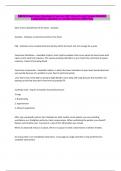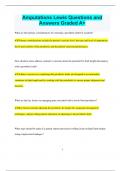NREMT Final Exam | Questions & Answers (100 %Score) Latest Updated 2024/2025
Comprehensive Questions A+ Graded Answers | 100% Pass
Most severe dysrhythmia of the heart - Asystole
Asystole - indicates no electrical activity in the heart
PEA - indicates some residual electrical activity within the heart, but not enough for a pulse
Ventricular fibrillation - shockable rhythm, heart rhythm problem that occurs when the heart beats with
rapid, erratic electrical impulses. This causes pumping chambers in your heart (the ventricles) to quiver
uselessly, instead of pumping blood.
Ventricular tachycardia - shockable rhythm, in which the lower chambers of your heart (ventricles) beat
very quickly because of a problem in your heart's electrical system.
your heart may not be able to pump enough blood to your body and lungs because the chambers are
beating so fast that they don't have time to properly fill.
Cushing's triad - Sing of increased intracranial pressure
3 sings
1. Brachicardia
2. hypertension
3. Altered respirations
After your paramedic partner has intubated an adult cardiac arrest patient, you are providing
ventilations as a firefighter performs chest compressions. When ventilating the patient, you should? -
Deliver each breathe over 1 second at a rate of 8 to 10 breathes per minute
When an advanced airway is in place, there is no pause in chest compressions to deliver breaths.
An airway that is not completely obstructed - encourage to cough, heimlich is only performed on
complete obstructions
,Infant respiratory rate - 25-50
Bradycardia - The condition of having a slow heartbeat, defined as under 60 beats per minute for an
adult.
Hypertension - progressively increasing systolic blood pressure, leading to widening pulse pressure
Mediastinum - Region in mammals including the thoracic area just not the lungs, so the heart the
trachea, the thymus gland are all included in it
What are the two methods for opening the airway of an unconscious patient?
When would you use one over the other? - Jaw-thrust and head-tilt chin-lift
spine injury
What is the main complication of suctioning the airway for more than 10 seconds? - Could lead to
hypoxia
What flow rate for a nasal cannula and when should it be used - Flow rate: 1-6 lpm
When it's used: Nasal cannulas are used to deliver oxygen when a low flow, low or medium
concentration is required, and the patient is in a stable state.
When should you use a NRM and at what flow rate? - Use when patent needs oxygen but can breath on
their own and is getting sufficient tidal volume and O2 percent, flow rate of 10-15 lpm
When should you use a bag-valve mask and at what flow rate? - Use when patient is unconscious and
not breathing adequately or isn't getting enough O2 or has stopped breathing, use 10-15 lpm, if patient
is breathing less than 12 times a min or more than 24 use BVM and check to see if it's working by looking
at rise and fall of chest
How would you ventilate a patient who has a Stoma? - If there is a tracheostomy tube in place put the
BVM on that and ventilate (after taking mask off) if no tube put a special mask over the stoma and if you
don't have a special tracheostomy stoma mask use a child or infant BVM mask
,cover nose and mouth
What is the medicine inside an MDI and how does it work? - A metered-dose inhaler (MDI) is a device
that delivers a specific amount of medication to the lungs, in the form of a short burst of aerosolized
medicine that is usually self-administered by the patient via inhalation.
Medications are things like Bronchodilators like albuterol
What are the indications of a MDI? - patients with known COPD or asthma with acute exacerbations.
patients without known respiratory disease who exhibit expiratory wheezing.
must be prescribed
What are the contraindications of a MDI? - Airflow obstruction due to foreign body
Airflow obstruction and an MI
Not used as the first drug to help with congestive heart failure
Hypersensitivity, tachycardia, MI.
What can albuterol treat? - Albuterol can quickly relieve shortness of breath, coughing, wheezing, and
chest tightness.
relaxes muscles in the airways and increases air flow to the lungs.
Administering MDI - Shake for 30 sec, administer while patient inhales and encourage to hold breath
Dyspnea - Difficult or labored breathing
Retractions - Sign of increased muscle use for breathing, sings of someone having difficulty breathing
Belly breathing - Seeing the chest rise when a child is breathing because their ribcage muscles are not
developed enough to get enough air, ok if the tidal volume and breathing rate are normal
Auscultations - Listening to the heart or lungs with stethoscope
, What does pulse oximetry measure? - Measures the O2 saturation of someones blood
What are three conditions that can give a false pulse oximetry reading? - Dark nail polish
Patient moving too much
Dust and dirt
Hand tremors
The 3 conditions: peripheral vascular disease, vasoconstrictor medications, severe hypotension and
hypothermia.
peripheral vascular disease - narrowing of the blood vessels that carry blood to the extremities
hypotension - abnormally low blood pressure, caused by sudden loss of blood (shock), severe infection,
heart attack, or severe allergic reaction (anaphylaxis)
hypothermia - Being severely cold
Decreasing mental status, Decreasing motor and sensory function and Changing vital signs.
Early or superficial cold injury usually involves the tips of ears, the nose the tips of toes and fingers, and
the chin
Late or deep cold injury involves both the skin and tissue beneath it
The pulse, breathing, and blood pressure are difficult to assess in a hypothermic patient.
A pt with a core body temp of 95 or less is considered hypothermic
How does Chronic Obstructive Pulmonary Disorder (COPD) affect a patient's respiratory effort and
breathing? - Pursed lips, barrel chest, tripoding, loss of elasticity of the lungs, dry cough, dyspnea
Chronic obstructive lung disease (COPD) describes a group of lung conditions (diseases) that make it
difficult to empty the air out of the lungs. This difficulty can lead to shortness of breath (also called
breathlessness) or the feeling of being tired
What treatment would you administer to a patient with difficulty breathing due to COPD? - Position of
comfort and administer O2 with NRM or PPV w/ BVM





